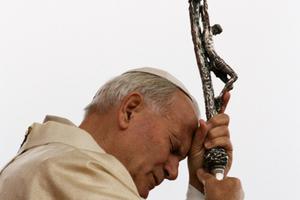Catholics Invited to Make Pilgrimage in Dante’s Footsteps in Anniversary Year
“It is precisely in these two cities that the deep soul of the poet is contained. We can still breathe it in some alleys and places that have remained intact over the centuries.”

The poet Dante famously traveled through Hell, Purgatory, and Paradise in his masterpiece the “Divine Comedy.” Now, Catholics have a chance to follow in his footsteps — his earthly ones, that is.
Dante’s Walk is a 235-mile route that takes pilgrims from the Byzantine splendor of the city of Ravenna, northern Italy, to the Renaissance magnificence of Florence — and back again.
The pilgrim path’s 20 stages are set out in detail in a new Italian guidebook, written by Marcello Bezzi, Silvia Rossetti, and Massimiliano Venturelli, coinciding with the 700th anniversary of Dante’s death.
“Ravenna and Florence are, in fact, the two symbolic cities of Dante, of his youth, his formation, his political life, and his death,” Venturelli told ACI Stampa, CNA’s Italian-language news partner.
“It is precisely in these two cities that the deep soul of the poet is contained. We can still breathe it in some alleys and places that have remained intact over the centuries.”
“And it is in these two cities that we wanted to build two city itineraries, thanks to which it is possible to visit and admire the places that characterized the life and formation of Dante Alighieri.”
Pilgrims begin at Dante’s tomb in Ravenna, where the poet died in 1321. They then set out on foot, mountain bike, or even horseback for the next stop in Pontevico, a municipality in the province of Lombardy.
In the following days, they pass through countryside teeming with medieval villages and castles, before arriving at Dante’s House Museum in Florence, the city where the poet was born in around 1265.
The house is close to the church of Santa Margherita de’ Cerchi, where Dante first saw Beatrice Portinari, widely identified as the muse who inspired his 1294 work La Vita Nuova and guided the poet through Paradise in the third and final part of the Divine Comedy.
Pilgrims then turn back towards Ravenna, taking a different country route.
The association Il Cammino di Dante recommends that travelers prepare carefully for the journey. It encourages pilgrims to book accommodation three weeks before departure and two months ahead in the peak months of July and August.
It advises hikers to carry a backpack weighing no more than 10 kilograms (22 pounds), including a sleeping bag, camping mat, utility knife, sunscreen, water, and energy bars.
A “Year of Dante” was launched in Ravenna on Sept. 5, 2020, in the presence of Italian President Sergio Mattarella. The year being marked by events throughout Italy.
Pope Francis said on Oct. 10, 2020, that the 700th anniversary of Dante’s death should inspire people to rediscover the “Divine Comedy.”
Speaking to a delegation from the Archdiocese of Ravenna-Cervia, the Pope announced that he was preparing “a more extensive reflection” on the leading poet of the late Middle Ages to be released in 2021.
The Pope said he hoped that teenagers, in particular, would engage with the Divine Comedy, widely regarded as the greatest poem in the Italian language.
He said: “It may seem, at times, as if these seven centuries have opened up an unbridgeable distance between us, men and women of the postmodern and secularized age, and him, the extraordinary exponent of a golden age of European civilization. And yet something tells us that it is not the case.”
“Teenagers, for instance — even those of today — if they have the opportunity to encounter Dante’s poetry in a way that is accessible to them, find, on the one hand, inevitably, a great distance from the author and his world, and yet, not the other, they perceive a surprising resonance.”
The Vatican City State Mint issued a color collector coin featuring Dante last month.
Asked to name the highlights of Dante’s Walk, Venturelli said: “Certainly not to be missed are the stages passing through the Casentino [valley], and I refer to Campaldino, Poppi, Porciano, Romena and the Hermitage of Camaldoli, inextricably linked to Dante’s life from 1289 onwards.”
- Keywords:
- dante
- pilgrimage

















